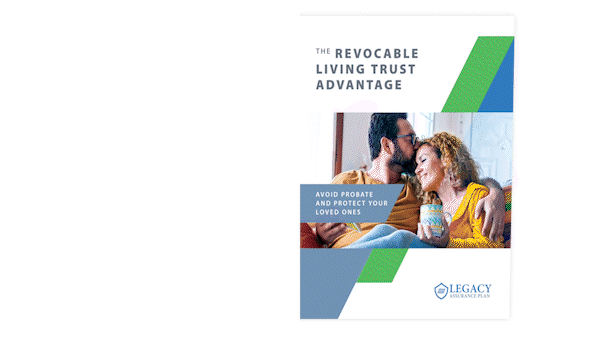A testamentary trust and a revocable living trust are both estate planning tools, but they differ significantly in terms of their formation, activation and purpose.
A testamentary trust is created by a last will and testament and comes into existence only after the person who created the will (the testator) dies and the will goes through probate. It does not exist or hold any property during the lifetime of the testator.
On the other hand, a revocable living trust is established by a trust agreement during the lifetime of the grantor (the person who creates the trust) and can hold property immediately upon its creation. This type of trust is “revocable” because the grantor retains the right to amend or revoke the trust at any time during their lifetime.
The primary purpose of a testamentary trust is typically to provide a structured distribution of assets to heirs, often when they are minors or when the testator wants to impose certain conditions or restrictions on the inheritance. The testamentary trust is irrevocable after the testator's death, meaning its terms, which are detailed in the last will and testament, cannot be changed.
A revocable living trust, however, is primarily used to avoid probate, manage assets during the grantor’s incapacity and maintain privacy regarding the grantor’s assets. The grantor usually acts as the initial trustee and has complete control over the assets in the trust, with the ability to change the trust terms or dissolve the trust entirely during their lifetime.
Can a trust protect my assets?
While a revocable living trust offers more flexibility and control, it usually provides less asset protection against creditors during the grantor's lifetime as compared to a testamentary trust. This is because the assets in a revocable living trust are still considered to be owned by the grantor. In contrast, assets in a testamentary trust are generally protected from the beneficiaries’ creditors because the assets are not owned by the beneficiaries.
In a testamentary trust, beneficiaries may have restricted access to trust assets, depending on the conditions set by the testator in the will, whereas, in a revocable living trust, the grantor can also be a beneficiary and can freely use and benefit from the trust assets during their lifetime.
Do trusts have tax implications?
A testamentary trust and a revocable living trust serve distinct roles in estate planning, marked by their unique structures and tax implications. For a revocable living trust, created during the grantor's lifetime, the grantor, maintaining control over the trust's assets, is accountable for income tax on any income those assets generate. It is customary for the trust's income and deductions to be reported directly on the grantor’s individual income tax return.
Furthermore, for estate tax purposes, the assets in a revocable living trust are included in the grantor’s gross estate since the grantor retains control over the assets throughout their life. As the grantor possesses the capability to revoke the trust, transfers to a revocable trust do not constitute completed gifts and therefore, do not invoke the gift tax.

On the other hand, a testamentary trust, enacted after the testator's death, stands as a distinct tax entity and is obliged to file its own income tax return, utilizing IRS Form 1041. Depending on the trust's terms and the distribution of income to beneficiaries, the trust may be liable for income tax, or the beneficiaries may be taxed on their share of the distributed income. The assets funding a testamentary trust are integrated into the decedent’s estate and are consequently subject to estate taxes. Nonetheless, after settlement of the estate tax, the residual assets in the trust aren’t subject to further estate taxes upon the beneficiaries' death, except if the trust assets are integrated into the beneficiary's estate. Given that a testamentary trust is established after the death of the testator, no gift tax implications emerge for the testator when the trust is eventually funded.
In comparison, control and tax responsibility in a revocable living trust are shouldered by the grantor during their lifetime, whereas a testamentary trust assumes its own tax responsibilities following the testator’s demise. Both trust assets are incorporated in the estate of the deceased for estate tax purposes, but the repercussions on beneficiaries vary, especially regarding subsequent estate taxes on remaining trust assets. A revocable living trust circumvents the need for a separate tax return during the grantor's life, contrasting with a testamentary trust. In terms of income tax, the grantor is taxed in a revocable trust, and in a testamentary trust, the tax is levied on either the trust itself or the beneficiaries, dependent on the income generated by the trust.
Discerning the varying tax implications of testamentary and revocable living trusts is pivotal in forming an estate plan. The decision between the two should encompass consideration of individual financial scenarios, estate planning objectives and prospective tax liabilities, typically under the guidance of an estate planning attorney or a tax advisor.
What are the key advantages of a revocable living trust?
The advantages of a revocable living trust center around providing flexibility, privacy and ease in the management and transfer of assets during life and after death. It serves as a comprehensive tool for addressing various estate planning needs and goals, allowing for a tailored approach to asset distribution and family wealth preservation. However, it's crucial to consult with an estate planning attorney to determine if a revocable living trust is suitable based on individual circumstances and objectives.

Let’s take a look at some advantages of a revocable living trust.
- Avoidance of probate. Probate is a court-supervised legal process that occurs after a person's death in which their estate is administered and settled. It involves validating the deceased’s will if one exists, taking inventory of the deceased person's assets, paying off debts and taxes and distributing the remaining assets to the heirs or beneficiaries as per the will or, if there is no will, according to state intestacy laws. A fundamental advantage of a revocable living trust is the avoidance of probate, which can be a lengthy and expensive process. This means that assets within the trust can be quickly and smoothly transferred to the beneficiaries without court intervention.
- Privacy. Because a will becomes a public document once it is probated, anyone can access information about the deceased person’s assets, debts, beneficiaries and the terms of their will. However, a revocable living trust operates privately, and the details of the trust, including the assets it holds and the identity of the beneficiaries, are not made public. This keeps the distribution of assets private and confidential. The grantor of a revocable living trust has control over the disclosure of information related to the trust. Specific terms can be included in the trust agreement to limit what information is disclosed to beneficiaries or other parties.
- Flexibility. A revocable living trust is known for its inherent flexibility as an estate planning tool, enabling individuals to modulate their estate plans in alignment with evolving needs and circumstances. This tool is versatile, primarily due to the grantor's ability to amend or revoke it throughout their lifetime, permitting alterations to the terms of the trust, addition or removal of assets, and adjustments to beneficiaries as the grantor’s wishes or situations modify. This adaptability ensures the trust can remain relevant and fit the grantor's needs or goals, even if they change over time.
Moreover, grantors maintain pervasive control over the trust’s assets during their lifetime. This means they are free to manage, sell or utilize the trust assets as they deem appropriate without necessitating approval from beneficiaries or trustees. Such control is crucial for enabling the grantor to respond promptly to changing personal or financial circumstances. Additionally, this trust provides the facility to designate a successor trustee. This appointed individual can seamlessly assume the management of the trust's assets should the grantor become incapacitated, avoiding any disruption in asset management and eliminating the need for court-appointed guardianship or conservatorship.
In cases of incapacity, the revocable living trust ensures continuity of management, allowing the successor trustee to adhere to the grantor’s wishes in managing and distributing assets without interruption. This provision is vital in maintaining the grantor’s intentions even when they are unable to execute decisions themselves. The trust also offers the advantage of avoiding probate, facilitating the direct and swift transfer of assets to beneficiaries and maintaining the confidentiality of the details of the trust and asset distribution.
Moreover, the structure of a revocable living trust is adaptable to changing tax laws and situations, ensuring optimal tax planning and minimal tax liabilities. It enables the grantor to embed tailored provisions within the trust document to address distinct concerns, needs or desires, providing a personalized estate planning solution. This customization can include the imposition of conditions for beneficiaries to receive assets or the establishment of sub-trusts.
Furthermore, grantors have the liberty to dictate detailed instructions and conditions regarding the distribution of assets to the beneficiaries, providing nuanced control and ensuring the grantor’s explicit wishes are met. In conclusion, the multifaceted flexibility of a revocable living trust makes it an attractive choice for individuals seeking a refined, adaptable estate planning solution, capable of accommodating shifting needs, circumstances, and legislative environments. Consulting a knowledgeable estate planning attorney is pivotal in leveraging this flexibility to its maximum potential, aligning the benefits with individual aspirations and situations.
- Avoiding ancillary probate. A revocable living trust can be a pivotal tool in avoiding ancillary probate, particularly for individuals who own real property in multiple states. Ancillary probate is a supplementary probate process that is required for real estate owned in a state other than the state where the deceased person was a resident. This can be a cumbersome and expensive process, given the varying probate laws in different states, and it can significantly lengthen the overall probate procedure.
- Protection from challenges. While not completely immune from legal challenges, trusts are generally more difficult to contest than wills, offering a degree of protection against disputes. A well-drafted revocable living trust can contain clear, unambiguous instructions regarding the distribution of assets and the management of the trust, reducing the possibility of misunderstandings or disputes among beneficiaries.
By avoiding probate, a revocable living trust keeps the estate details private, significantly reducing the likelihood of legal challenges. Trusts are generally more difficult to contest than wills. The legal standards for invalidating trust provisions are high, often requiring substantial proof of undue influence, lack of capacity or fraud.
What are the key advantages of a testamentary trust?

While testamentary trusts may not offer the same level of control, flexibility and privacy as living trusts, they can be a preferred estate planning option for those seeking cost efficiency, court supervision, clear asset distribution directives and protection for beneficiaries. The choice of a testamentary trust should be based on individual circumstances, financial goals, family dynamics and estate planning objectives, often warranting consultation with an estate planning attorney to ensure alignment with the individual’s overarching estate planning goals.
There are several advantages to using a testamentary trust as an estate planning tool, which may make it a preferable option for some individuals. Let’s examine some of those advantages:
- Protection for beneficiaries. Testamentary trusts can offer protection to beneficiaries who may not be able to manage their inheritances effectively due to their age, disability or financial irresponsibility. By establishing a testamentary trust, a grantor can ensure a responsible trustee manages the assets until the beneficiary reaches a certain age or meets other stipulated conditions.
- Flexibility in distribution. The grantor can dictate the terms of the trust, specifying when and how the beneficiaries will receive the assets. This allows for a more tailored approach to asset distribution, considering individual beneficiaries’ needs and circumstances.
- Court supervision. Unlike other types of trusts, testamentary trusts are subject to ongoing court supervision, which can be advantageous in ensuring that the trustee is managing the trust assets properly and following the grantor’s instructions. This adds an extra layer of protection for the beneficiaries.
- Estate tax planning. Testamentary trusts can be structured to take advantage of estate tax exemptions and exclusions, potentially reducing the estate tax burden on the beneficiaries.
- Cost efficiency. Since a testamentary trust is formed as part of a will, it does not incur the initial setup and ongoing administrative costs during the grantor’s lifetime that are associated with living trusts. This can make it a more cost-effective option for those with simpler estate planning needs.
- Prevents premature asset dissipation. By controlling the distribution of assets, a testamentary trust can prevent beneficiaries from squandering their inheritances prematurely or falling victim to scams or undue influence.
- Protection from creditors. Assets in a testamentary trust can often be protected from the beneficiaries’ creditors, depending on the trust terms and applicable state law, which can be particularly advantageous if a beneficiary is prone to debt or legal judgments.
- Clarification of intentions. A testamentary trust, by detailing the grantor’s wishes regarding asset distribution and beneficiary stipulations, can provide clarity and potentially prevent family disputes and legal challenges related to asset distribution.
- Charitable giving. Testamentary trusts can be used to make charitable gifts, allowing the grantor to leave a legacy to charitable organizations while also potentially benefiting from estate tax reductions.
Conclusion
When it comes to the comparison of testamentary trusts and revocable living trusts in estate planning, it is evident that each has its own set of advantages and disadvantages. Testamentary trusts offer the advantage of providing structured and controlled distribution of assets after death, ensuring that beneficiaries receive their inheritances in a responsible manner.
On the other hand, revocable living trusts provide flexibility during one's lifetime, allowing for changes and modifications as circumstances evolve. While testamentary trusts may be more suitable for individuals with complex family dynamics or those seeking to exercise greater control over the distribution of their assets posthumously, revocable living trusts can be advantageous in avoiding probate and maintaining privacy.
Moreover, they offer a seamless transition of assets during incapacity while allowing the grantor to retain control over their assets until they pass away. When making decisions regarding trust selection in inheritance planning, it is crucial for individuals to thoroughly evaluate their specific needs and goals.
Understanding the features and intricacies of both testamentary trusts and revocable living trusts is key to making well-informed decisions. Ultimately, asset protection can be achieved through both types of trusts by designating appropriate trustees or using certain strategies within the trust structures.
It is advisable for individuals to consult with experienced estate planning professionals who can provide personalized guidance based on their unique circumstances. Despite their differences, both testamentary trusts and revocable living trusts serve important roles in estate planning.



